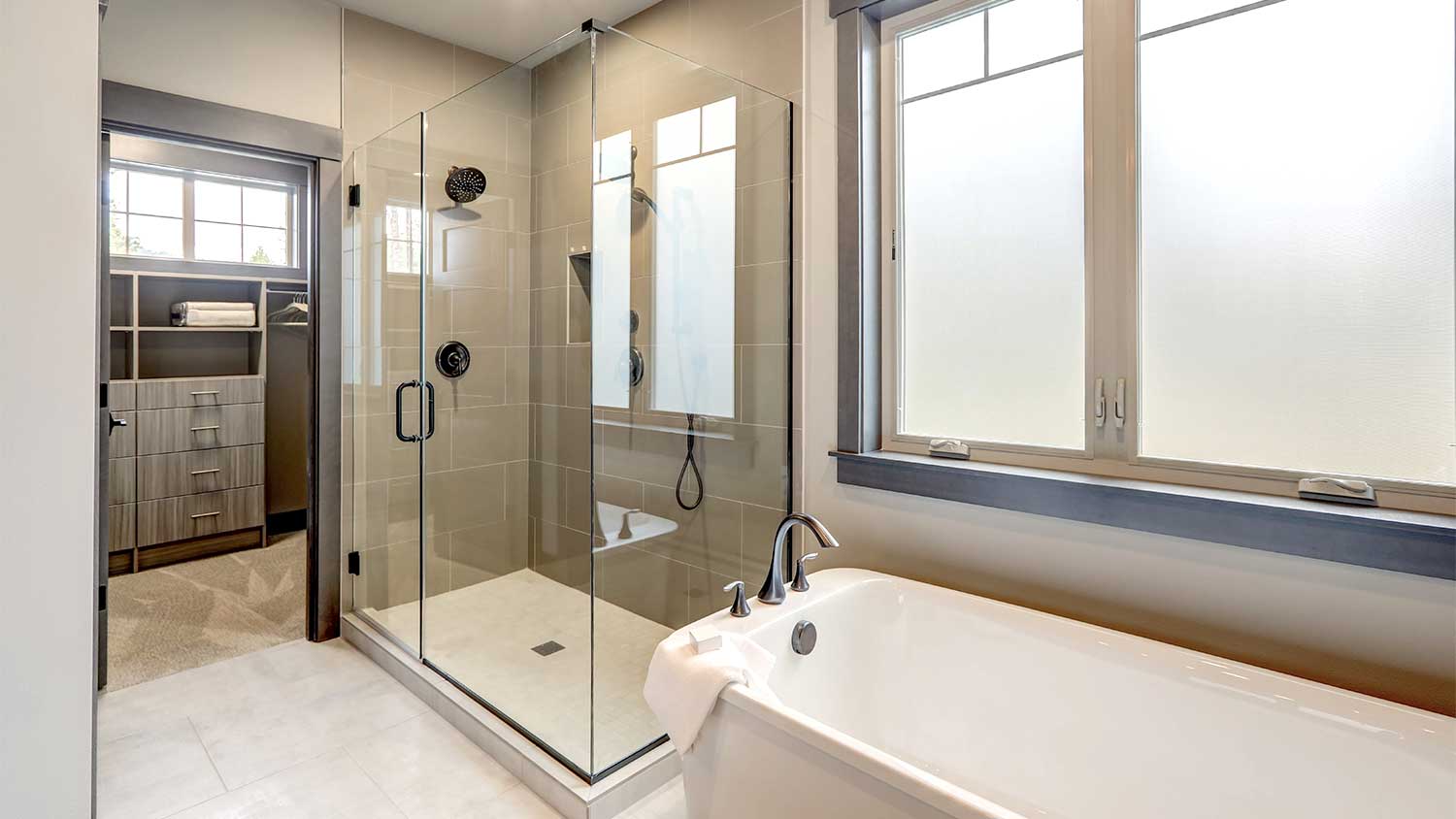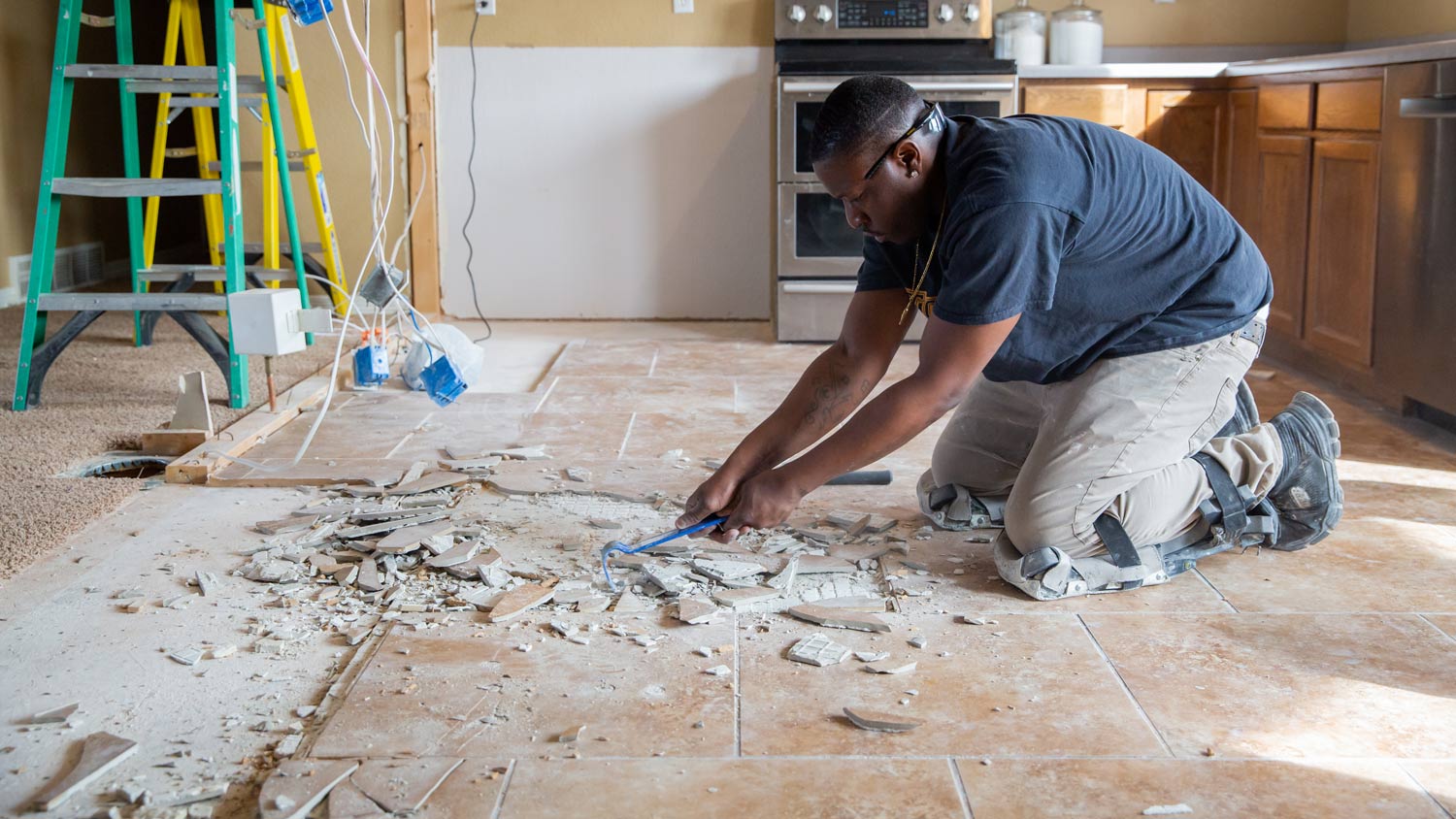
Thinking of getting rid of that old bathtub and replacing it with a walk-in shower? This walk-in shower cost guide will help you plan your budget.
Kitchen and bathroom remodel costs depend on your project and location. Check with a local pro for your specific job.
The price of demoing a kitchen depends on the extent of the project, but ranges between $5 to $12 per square foot.
Minor kitchen demos can cost between $500 and $1,000, while larger kitchens can range from $1,200 to $2,800.
You can expect to pay a contractor $50 to $100 per hour to demo your kitchen.
Removing a load-bearing is one of the most expensive kitchen demo tasks and can cost between $1,200 to $10,000.
The average cost to demo a kitchen is $800, but it can range anywhere from $230 to $3,800. If you’re planning a kitchen remodel to transform the heart of your home, you first need to strip away what’s already there. The amount you’ll spend depends on your kitchen size, the extent of the demo, the materials involved, and the cost of labor in your area.
Let’s dive into the details and break down what it costs to demo a kitchen.
The cost to demo a kitchen is wide-ranging. How much you spend depends on various factors. Take the following into account when setting a budget.
It makes sense that the bigger the kitchen, the bigger the cost. The average cost to demo a kitchen ranges from $5 to $12 per square foot. Demolishing a small kitchen requires less labor and equipment, and hauling away the waste won’t require such a big dumpster.
The average kitchen size is 161 square feet. You could pay between $800 and $2,000 to demolish a kitchen of this size.
Some companies will charge a minimum flat-rate fee for kitchen demo work or an hourly rate. So even if your kitchen is small or you’re only doing a partial demo, they might charge more than the minimum price-per-square-foot estimates. Below are some estimated price ranges for common kitchen sizes.
| Kitchen Size | Square Footage | Average Price Range |
|---|---|---|
| Small | 100 square feet | $500–$1,200 |
| Medium | 161 square feet (average size) | $800–$2,000 |
| Large | 238 square feet (large) | $1,200–$2,800 |
The materials used and the complexity of construction influence demo costs. Heavy marble counters might require specialist equipment or extra labor to remove. Waste disposal fees for heavy or non-recyclable items can also be higher.
Most contractors charge by square foot, but some use hourly rates. Expect to pay around $50 to $100 per hour, and always ask about minimum flat-rate fees.
A complete tear-out isn’t necessary for some kitchen remodels. You might only replace cabinets and countertops or remove a wall to create an open-plan living space. Whether you’re doing a partial or complete kitchen demolition makes a big difference to your budget.

Check out this breakdown of common kitchen fixture and fitting removal costs to help achieve a more accurate cost estimate.
Bear in mind these costs refer to demo costs of the individual elements. The costs will be less when contractors carry them out as part of a bigger kitchen demo project.
| Type of Fixture or Fitting | Average Cost |
|---|---|
| Tile | $2–$4 per square foot |
| Carpet and flooring | $1–$5 per square foot |
| Cabinets | $300–$500 |
| Fireplace and chimney | $500–$7,000 |
| Non-load-bearing walls | $300–$1,000 |
| Load-bearing walls | $1,200–$10,000 |
| Fixtures | $50–$300 |
| Appliances | $60–$600 |
| Countertops | $50–$300 |
The cost to remove tiles ranges from $2 to $4 per square foot. If you’re hiring a professional tile remover, check they include tile disposal as well as removal in their quote.
If you plan on ripping up the flooring in your kitchen, laminate or carpet removal costs $1 to $5 per square foot. It’s usually on the lower end of the scale unless stairs or tricky access are involved.
Sometimes, stripping out cabinets is enough to give your kitchen a major makeover. Professional cabinet removal costs typically range from $300 to $500 depending on the number of cabinets, their material, and the complexity of their construction. You might recoup some of your costs if you can sell vintage cabinets in good structural condition.
Fireplace removal costs are high because of the complexity of this structural project. If this is part of your kitchen demolition project, expect it to add $500 to $2,000 for partial demolition and an average of $7,000 for full demolition. You’ll also need contractors experienced in this type of work.
The average cost to remove a wall is $300 to $1,000 for non-load-bearing and $1,200 to $10,000 for a load-bearing wall. Removing a wall in your kitchen to change the layout or create an open-plan living space isn’t a straightforward kitchen demolition project. This structural work needs specialist contractors and often permits.
If you're just replacing your fixtures, you could pay $50 to $300 per sink, door, HVAC unit, or window. Disposal costs are higher for things like HVAC units dealing with refrigerant and hazardous waste.
If you want to get rid of your appliances, expect professional junk removal costs to be between $60 to $600 to dump your dishwasher and fling your fridge. Costs vary depending on the number of items you're dumping, their size, and whether they are classified as hazardous waste.
Replacing those scratched and faded kitchen countertops can freshen up your space. Expect to pay anywhere from $50 to $300 for countertop removal. The size and weight of the countertop affect the price, as do any complex plumbing workarounds.
As well as the standard costs to demo a kitchen, you might have to factor in other expenses as part of the project.
| Additional Demo Consideration | Cost Range |
|---|---|
| Permits | $50–$500 |
| Utility connections | $50–$100 per hour |
| Asbestos removal | $5–$20 per square foot |
| Deconstruction | $7–$14 per square foot |
| Pipe repairs | $150–$850 |
| Support beam replacement | $1,500–$5,000 |
It’s easy to overlook, but always check if you need a permit for your kitchen demolition project. Rules vary by state, but anything involving structural work or interferences with utilities typically requires a permit before work commences.
The cost for a building permit ranges from $50 to $500 (or more for major structural demolition), depending on the local regulations and what the project involves.
When you're demolishing walls or removing HVAC units, you’ll need to shut off water and electricity supplies. And your contractor may need to deal with any wires or plumbing running through the walls. It might be necessary to hire an electrician near you or a plumber to handle this safely and appropriately. The cost to hire an electrician or a plumber is typically between $50 and $100 per hour.
If you're giving your old kitchen a long overdue makeover and doing major demolition work, there's a risk of finding harmful asbestos. It was commonly used in walls, flooring, and plumbing in houses built before 1970. If there’s any doubt, get an asbestos inspection before getting stuck into a wall with a sledgehammer. Professional indoor asbestos removal costs anywhere from $5 to $20 per square foot, depending on the location.
Normal kitchen demolition involves removing the materials without the need to save any of the parts. But if you want to recycle, donate, or reuse parts, the contractors must dismantle the pieces more carefully. This deconstruction service takes more time and can be more expensive—typically from $7 to $14 per square foot. However, it means you will be doing your bit for the environment or a good cause. You could even make some money selling cabinets, fixtures, or building materials.
Sometimes, demolishing a kitchen can uncover problems, like rotten floor beams or leaky plumbing, that need fixing before you get stuck in kitchen remodeling work. Pipe leak repairs cost an average of $500, and the average cost to replace a rotted support beam is $3,250.
You can save big by DIYing your kitchen demo project, provided you have the tools, time, and expertise. For simple jobs like removing cabinets, countertops, or flooring, you don’t need a lot of equipment, and the risk of making a costly mistake is minimal.
If there’s a lot of debris, you might need to factor in the cost to hire a junk removal service near you, which averages around $240, or the cost to rent a dumpster, which is around $380 per week.
For big jobs, you might also need to buy or rent specialist equipment like a circular saw and blades, a sledgehammer, a jackhammer, and more. This could add $100 to over $1,000 more and might not be a good investment unless you know you’ll use these tools for future projects.

DIYing all or part of the project isn’t the only way to decrease your kitchen demo costs.
Deconstruction, not demo. If you can make some cash selling in-demand stone countertops or vintage cabinets, the more costly option of deconstructing can be worthwhile.
Get multiple quotes. Don’t just opt for the first reputable local demolition pro that you contact. Shop around and get at least three quotes.
Bulky uplift. When you are DIYing, you could time your demo with your local authority's annual free bulky uplift. This saves you from renting a dumpster or hiring a junk removal service.
Don’t just demo the kitchen. If you have other home remodel projects planned, consider doing them at the same time as your kitchen. Your contractor will likely offer a better rate for doing a bigger demo job all at once.
Home is the most important place on earth, which is why Angi has helped more than 150 million homeowners transform their houses into homes they adore. To help homeowners with their next project, Angi provides readers with the most accurate cost data and upholds strict editorial standards. We extensively research project costs to develop the pricing data you see, so you can make the best decisions for you and your home. We rely on reputable sources, including the U.S. Bureau of Labor Statistics, academic journals, market studies, and interviews with industry experts—all to ensure our prices reflect real-world projects.
Want to help us improve our cost data? Send us a recent project quote to [email protected]. Quotes and personal information will not be shared publicly.
From average costs to expert advice, get all the answers you need to get your job done.

Thinking of getting rid of that old bathtub and replacing it with a walk-in shower? This walk-in shower cost guide will help you plan your budget.

A bidet—stand-alone, attachment, spray nozzle, or toilet combo—reduces toilet paper usage and saves money, but how much is a bidet? Here’s how much you’ll pay.

Whether you're dreaming up a new office or a peaceful sunroom, home addition costs will shape your design. Learn how much a home addition costs in Philadelphia, PA.

Adding kitchen cabinets to your ceiling is a budget-friendly way to increase your storage space and make your kitchen look more attractive.

This prep and staging area has numerous uses in the versatile modern home. Here’s what a butler’s pantry does and how you can add one to your home.

Mirror, mirror, on the wall—how do I hang you so you won’t fall? Get tips and tricks for how to hang a vanity mirror and keep your reflection straight.